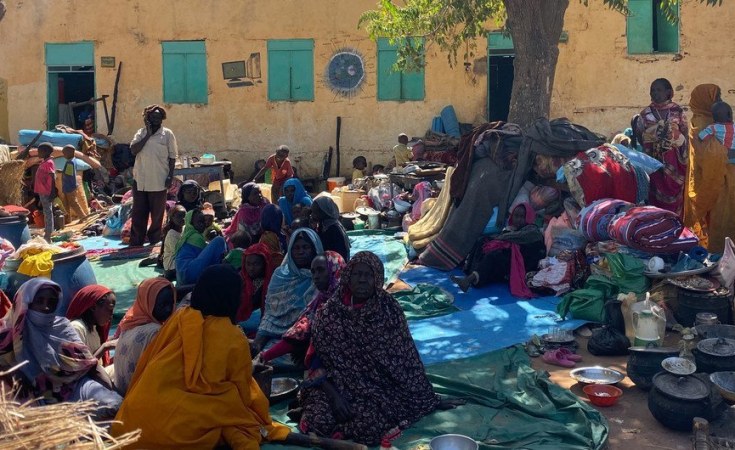Ed Damazin / Kauda — Fierce fighting erupted between the Sudan Armed Forces (SAF) and the Sudan People's Liberation Movement-North led by Abdelaziz El Hilu (SPLM-N El Hilu) in the area of El Kurmuk in Blue Nile region on Sunday. The battles continued on Monday, and led to the displacement of thousands of people. The rebel movement denies the existence of a ceasefire agreement with the government.
In a statement yesterday, the spokesperson for the Blue Nile government, Fawatih El Bashir, said that the SAF repelled an attack launched by SPLM-N El Hilu* forces on El Kurmuk, located more than 650 kilometres south of Ed Damazin, capital of Blue Nile region**. They are now in control of the area.
"We condemn the attack, and we fully support the SAF," El Bashir added.
The SAF reportedly seized 20 SPLM-N combatants. 13 SAF soldiers were injured.
The Humanitarian Aid Commissioner in the Blue Nile region, Ramadan Yasin, told Radio Dabanga on Monday that 35,745 people were displaced as a result of the clashes.
More than 32,000 people fled towards Dindiro area north of El Kurmuk. About 3,000 people crossed the border into Ethiopia.
"There is an urgent need for food supplies in Dindiro," Yasin said. "There will be a meeting between the UN refugee agency (UNHCR) and other aid organisations in order to assess the needs of those displaced in the area."
UNITAMS
On Monday, the United Nations Integrated Transition Assistance Mission in Sudan (UNITAMS) expressed its grave concern about the recent violence in the Blue Nile region and urged "all parties involved to immediately cease fighting in the interest of protecting the local population".
Less than a year ago, the region experienced violence that killed hundreds of people and displaced many others.
According to experts, the security vacuum created by the coup d'état in October 2021 cultivated a resurgence of intercommunal violence in a region already beset by lethal conflicts over land, livestock, and access to water.
Ceasefire
Last week, fighting between rebel fighters and army soldiers as well erupted in the Nuba Mountains in neighbouring South Kordofan. Clashes were reported near Delling in the northern part of South Kordofan and in the area south of the state capital Kadugli.
On social media, the SPLM-N El Hilu was accused of violating a truce with the Sudanese government. Mohamed Yousef, a leading member of the SPLM-N El Hilu, denied the existence of "any ceasefire agreement" with the government.
"Since the December 2018 revolution, we have repeatedly declared a unilateral ceasefire, so talk about us violating a ceasefire agreed on with the army is based on nothing."
He said that fighting erupted in Delling "because one of our combatants was killed by SAF soldiers at a market and they did not allow us to bury him.
"They also insulted us and called us names in a racist manner which forced us to exercise our rights and defend ourselves," he explained.
"We will free the Nuba Mountains from the military occupation, and we are committed to protecting people in the areas under our control," the rebel leader concluded.
Radio Dabanga reported two weeks ago that nearly 180,000 people who fled the fighting in Khartoum arrived in areas in in South Kordofan controlled by the SPLM-N.
* Abdelaziz El Hilu was deputy chairman of the Sudan People's Liberation Movement-North, led by Malik Agar, until he resigned in March 2017. Based in Kauda in the Nuba Mountains, El Hilu continued with most of the SPLM-N combatants in South Kordofan and Blue Nile region. The two factions fought heavy battles after that.
** On August 8, the governor of Blue Nile state issued a number of decrees, based on the October 2020 Juba Peace Agreement (JPA), by which the state became a 'region' and its seven localities (Ed Damazin, El Roseires, Wad El Mahi, Bau, Geisan, El Tadamon, and El Kurmuk) became 'governorates'. According to International IDEA, the JPA Blue Nile and [South and West] Kordofan protocol grants autonomy to these areas but does not stipulate they should become a region.


